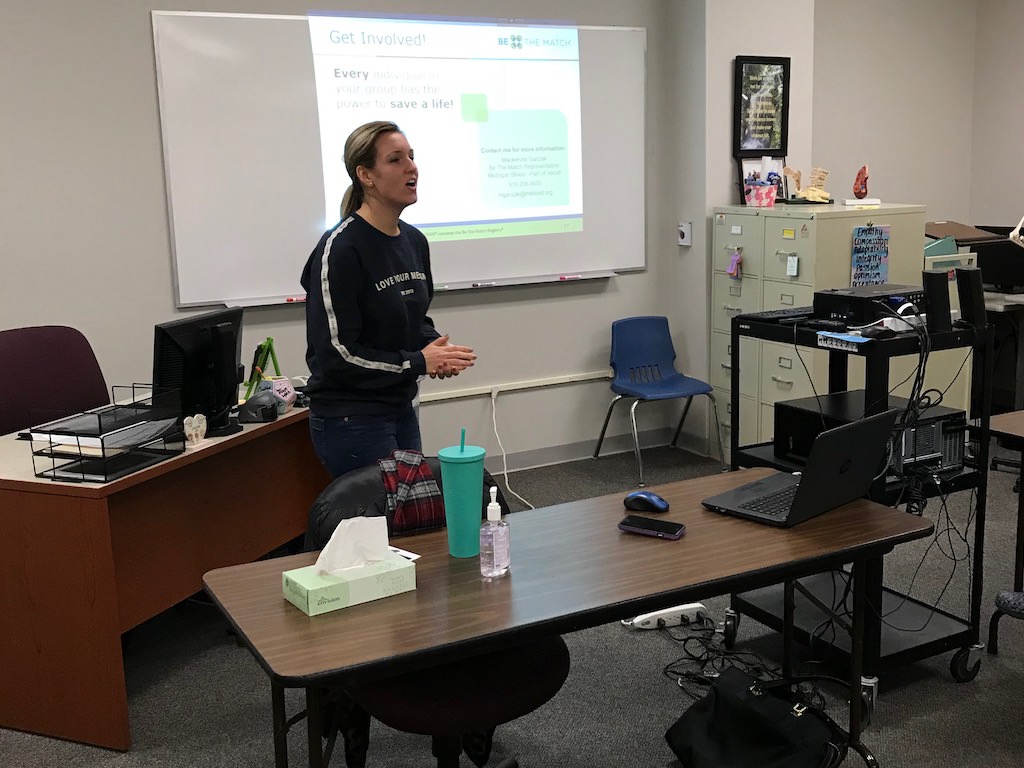 This winter, Ross Medical Education Center in Brighton, Michigan welcomed Mackenzie Ganzak from Michigan Blood’s Be the Match registry to discuss bone marrow donation. Students from the Pharmacy Technician program, Dental Assistant program, Medical Assistant Program, and Medical Insurance Billing and Office Administration program joined with faculty and staff to hear the presentation.
This winter, Ross Medical Education Center in Brighton, Michigan welcomed Mackenzie Ganzak from Michigan Blood’s Be the Match registry to discuss bone marrow donation. Students from the Pharmacy Technician program, Dental Assistant program, Medical Assistant Program, and Medical Insurance Billing and Office Administration program joined with faculty and staff to hear the presentation.
The Ross Brighton family has a special place in their heart for bone marrow transplants. Medical Assistant Instructor Lisa Smego has shared with the campus about how a bone marrow transplant saved her husband’s life. He went through the lifesaving procedure several years ago. The family was fortunate to have a family member as a donor.
The staff, faculty, and students were moved by the opening video depicting the story of a match success. Baby Clara received a donation from a football player that saved her life. The video drove home the importance of the registry as it strives to serve patients with leukemia, sickle cell anemia, and other blood cancers. Every three minutes someone is diagnosed with a blood cancer, according to Mackenzie. Students were shocked at the number and were eager to help.
During the presentation, Mackenzie explained there is currently a need for diverse potential donors as more than 70% of the donors on the registry are caucasian. To join the registry, students just needed to click on a link and enter their information. A home swab kit will then be sent for the students to use in the privacy of their home. The kit is easy to use as a potential donor just swabs their cheeks, drops the swabs in an envelope, and returns the envelope to Michigan Blood.
Mackenzie travels all over the state of Michigan to educate potential donors between the ages of 18-44 about the importance of joining the registry. Ross Education, LLC is an important partner of Be the Match and Mackenzie travels to each Michigan location twice a year to educate Ross students. She informs the students of the importance of the registry and how they can help patients in need. Mackenzie explained the process which is based on HLA tissue type rather than blood type. If a person is a potential match, they go through extensive testing to ensure they are a healthy candidate. All expenses for the donor are paid by the organization, including lost wages, travel expenses, meals, and hotel stays. Donors may bring a support person with them as well. Ms. Ganzak went on to explain that matches are made all over the world, and volunteers are also needed to courier the bone marrow to hospitals.
Since the Be the Match partnership with Ross began in 2013, Over 100 Ross students and staff have been chosen as good matches and seven have donated so far. Ross actually received the Community Advocacy Award at the Be the Match golf outing in 2015 for their dedicated partnership with this important organization.
For more information on Be the Match contact Caitlin at mganzak@miblood.org.
